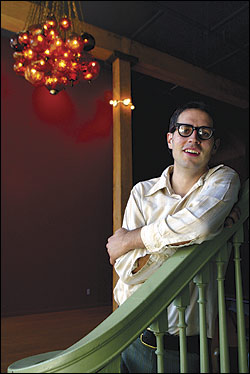THE MOVIE BUSINESS is in trouble at the Hollywood level. Ticket sales are down. People increasingly prefer cable, Netflix, and the home entertainment center to the ringing cell phones and chattering audiences at the multiplex. And maybe the movies just aren’t very good. It’s a different story on Capitol Hill, however, where the Northwest Film Forum (NWFF) is poised to celebrate its 10th anniversary with a Super Hits program of 30 favorite titles running Friday, Sept. 23, through Sunday, Oct. 2. (There’s also a party at 8 p.m. Wednesday, Sept. 21.) So if you missed past NWFF standouts like Flowers of Shanghai, Close-Up, or The Gleaners and I when they played the Forum’s old venues (the Grand Illusion and Little Theatre), here’s a chance to see them in the consolidated two-screen facility on 12th Avenue—which is coincidentally celebrating its first birthday. (See www.nwfilmforum.org for full schedule and details.)
Why has the nonprofit filmmaking and exhibition entity been able to endure, let alone thrive? Seattle has seen a good many arts organizations, lofty of spirit and noble of purpose, die before reaching 10 candles on the cake. And the fund-raising climate, though improved from the dot-com crash days, is still perhaps not what it was in 1995. Executive Director Michael Seiwerath recalls, “The original kernel was to help local filmmakers finish their movies,” since production facilities were priced and intended for the industry, not newbie directors. For these aspiring locals, WigglyWorld Studios, the production arm of NWFF, was “founded out of frustration and anger, not joy.” Helping to produce movies—like Money Buys Happiness and The Naked Proof—was a bigger priority back then than showing already completed movies, though NWFF did buy the Grand Illusion in 1997 and build the Little Theatre in 1999 to screen an array of work, new and old, local and otherwise.
But, crucially, NWFF has adhered to the cinémathèque model whereby filmmaking process and education remain paramount. You can see a movie practically anyplace—and oh, the lure of that flat-screen TV back home!—but making one requires facilities and classes such as NWFF offers. Today, according to Seiwerath, it helps produce some 80 titles a year (most of them shorts); it also houses the nonprofit Film Company, whose emphasis is features. Thus becoming a busy hub of filmmaking helps to attract a critical mass of filmgoers and NWFF members; Seiwerath says the latter have doubled in the last year to about 850. (With a staff of under a dozen full- and part-timers, the organization has an annual budget of around $700,000 supported by membership, ticket sales, grants, and private donors.)
Having consolidated operations in the walkable heart of Cap Hill surely helps, too. And NWFF patrons may be further attracted by its somewhat interdisciplinary aspect. Art installations, musical events, and theater productions were fairly common to the Little Theatre. Local artists, playwrights, and performers like the Typing Explosion, Michael Chick, Dayna Hanson, Curtis Taylor, and Gregg Lachow will likely continue their association with NWFF.
Take it from a film critic: The worst thing about movies is that they’re so passive. You sit there in the dark and you watch them, and then you leave. If you’re lucky, there’s someone to discuss them with on the walk or drive home. I think that’s one reason the movies are slipping nationally—and, frankly, why the annoying practice of talking in movie theaters has increased. People fundamentally crave the TV-and-couch experience because it’s more social, more active. Some cinemas are bucking the multiplex trend by offering real food and booze (locally, try the Big Picture and Central Cinema for such an experience). The Northwest Film Forum has succeeded by taking the opposite, practical tack: Get people excited by seeing a movie, and maybe they’ll make a movie—and vice versa. It works both ways.
Northwest Film Forum, 1515 12th Ave., 206-267-5380 (movie line), 206-329-2629 (office), www.nwfilmforum.org.








